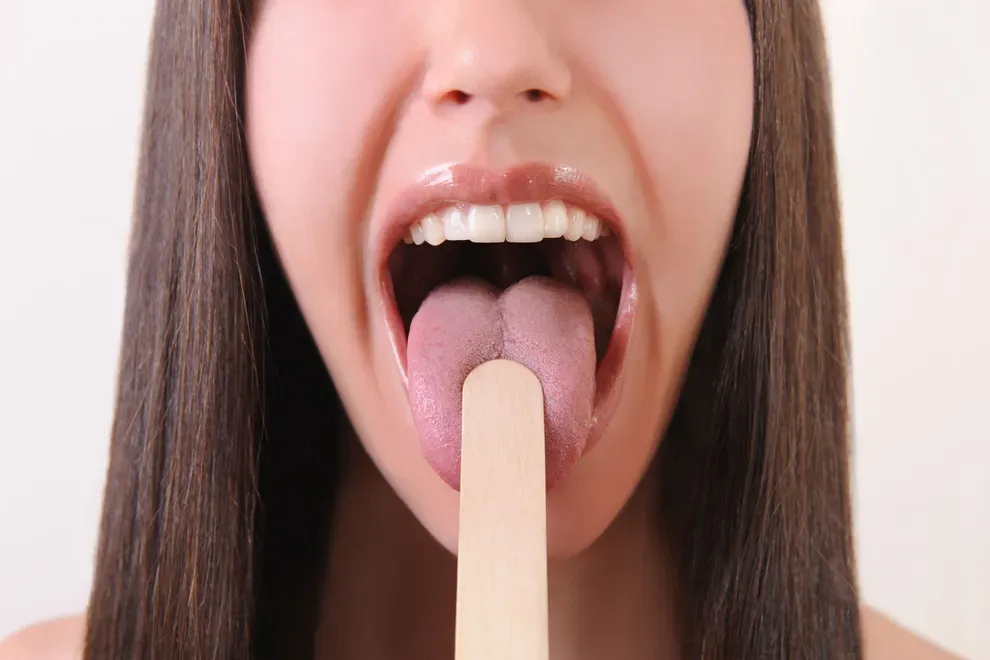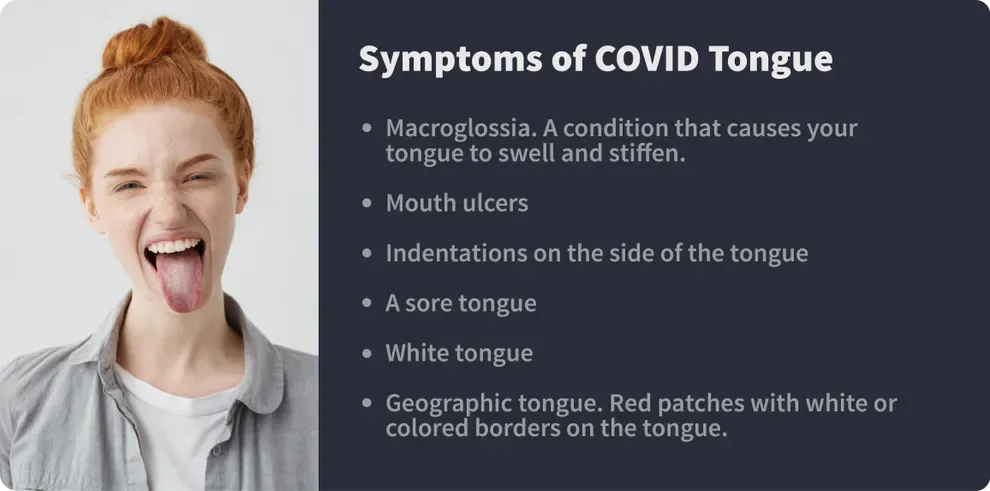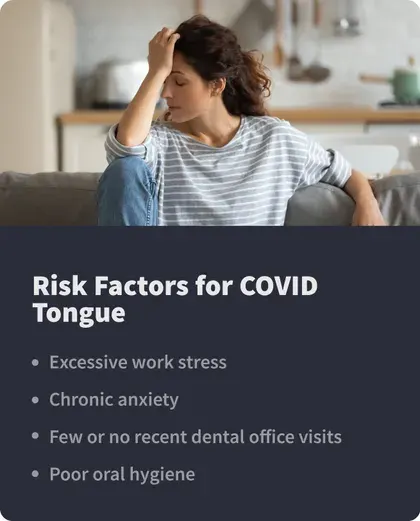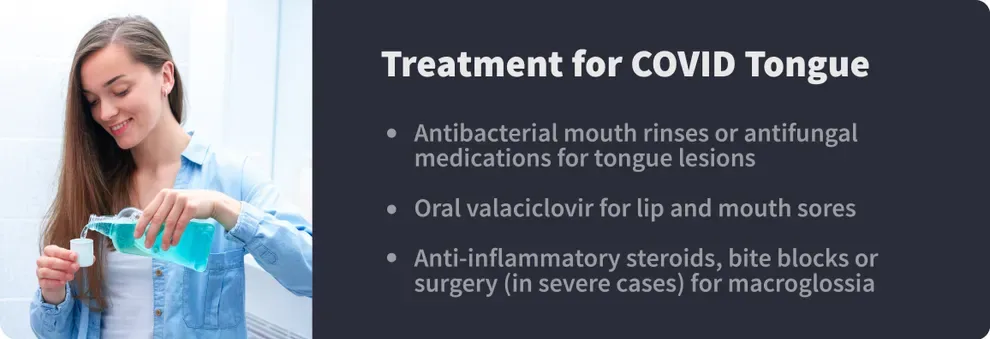COVID Tongue & Mouth Sores

Table of Contents
- What Is COVID Tongue?
- Symptoms
- Causes of COVID Tongue
- Mouth Ulcers & COVID
- What is Black Tongue COVID?
- Causes of Mouth Sores
- How Common Is It?
- Treatment
- How Long Does It Last?
- Outlook
COVID tongue is a condition that causes the tongue to swell, turn white or grow small bumps on the surface. About 11 percent of people who get COVID-19 experience tongue-related symptoms, but only 1 in 500 of them are diagnosed with COVID tongue.
Not all of the symptoms can be traced directly back to the coronavirus.
Much more research and study of COVID tongue is needed, experts say.
What Is COVID Tongue?
COVID tongue is a painful condition that causes the tongue to swell, turn white or grow small bumps on the surface. It may be accompanied by other oral issues like ulcers and a burning sensation in the mouth. In a study of 666 COVID-19 patients, 78 (11 percent) experienced these symptoms.
COVID tongue and mouth sores can be treated using antibacterial and antifungal medications and mouth rinses.
In rare cases, the condition can adversely impact your oral health and overall health.

Symptoms
Some common symptoms of COVID tongue include:
Macroglossia (a condition that causes your tongue to swell and stiffen)
Mouth ulcers
Indentations on the side of the tongue
A sore tongue
White tongue
Geographic tongue (red patches with white or colored borders on the tongue)
These mouth and tongue issues are also symptoms of many other oral health conditions. If you suspect that your case may be related to COVID-19, see your doctor for confirmation.
What Causes COVID Tongue?
The exact cause of COVID tongue is unknown, though it is likely related to the COVID-19 coronavirus. Scientists believe that the heavy concentration of ACE receptors (proteins that can easily host the virus) in the tongue makes symptoms like tongue swelling and lesions more likely. Further study is needed to confirm the association.
Mouth Ulcers & COVID
While more research needs to be done to identify the link between mouth ulcers and COVID, it’s important to keep in mind that mouth ulcers are open sores. This means they are vulnerable to bacteria and can allow bacteria and infections to enter the bloodstream.
This is why it’s especially important to keep harmful bacteria at bay as you recover from COVID mouth sores.
What is Black Tongue COVID?
While research is ongoing, it appears that most people who experience tongue discoloration with COVID experience a pale or light red tongue.1 A purplish or reddish tongue may also be seen.
A gray or black-coated tongue (also called a black hairy tongue) is less common but also reported. Although the black tongue may look more alarming, it is not necessarily more severe than the other tongue coating colors seen with COVID tongue.
What Causes Mouth Sores?

Oral symptoms like ulcers and lesions are not a direct consequence of a COVID-19 infection. Instead, opportunistic diseases, or secondary diseases, may trigger these effects, taking advantage of your lower immunity.
COVID-19 can compromise your body’s defense against bacterial and fungal infections as it progresses. Some COVID treatment plans can have this effect, too.
For example, immune system deterioration can reactivate the common herpes simplex virus in the body. This viral infection may then trigger many oral problems, including ulcers in the mouth and on the lips.
Lifestyle factors also may play a role.
Lifestyle Factors
Lifestyle factors that are associated with an increased risk of developing COVID tongue include:
Excessive work stress
Chronic anxiety
Few or no recent dental office visits
Poor oral hygiene
How Common Is COVID Tongue?
Your risk of developing COVID tongue or mouth sores is low. According to one expert’s estimate, less than 1 in every 500 COVID patients experiences these symptoms.
In another study of hospitalized individuals with the virus:
11 percent had tiny, inflamed bumps on their tongue
6 percent had a swollen tongue with grooves on the side
6 percent had mouth ulcers
4 percent had swelling elsewhere in their mouth
4 percent had patches on their tongue

Treatment of COVID Mouth Sores
If you experience any mouth or tongue complications with the coronavirus, see a dentist. Among the treatment options are:
Antibacterial mouth rinses or antifungal medications for tongue lesions
Oral valaciclovir (an antiviral drug used to control herpes infection) for lip and mouth sores
Anti-inflammatory steroids, bite blocks or surgery (in severe cases) for macroglossia
If your condition does not improve with treatment, you may be referred to a specialist.
How Long Does COVID Tongue Last?
While each patient responds differently to treatment, COVID tongue and mouth sores should disappear in 3 to 21 days.
You may be able to accelerate your recovery by following your doctor’s instructions, making diet and lifestyle changes, and practicing good oral hygiene.
While recovering from COVID tongue, following certain dietary restrictions may help speed up the healing process and avoid any further complications. These include the following:
Drink more water. Water acts as a natural cleanser for the teeth, tongue, and mouth, rinsing away problematic bacteria and particles.
Avoid spicy or acidic foods that may cause further irritation.
Avoid crunchy or hard to chew foods.
Avoid sugary food or drinks. These can encourage the growth of harmful bacteria, including plaque, which can increase the risk of decay and infections.
Sleeping is vital to illness recovery and stress reduction. If you’re having trouble sleeping while recovering from COVID tongue, try incorporating some of these tips:
Set a regular sleep schedule and follow it every day. This means waking up and going to bed at the same time each day, even on Saturday and Sunday.
Don’t drink caffeine after noon.
Make your bedroom comfortable, dark, and quiet.
Don’t exercise within two to three hours of trying to go to bed.
Don’t take long naps during the day, and don’t nap after 3 pm.
Shut off “screens” and electronic devices at least an hour before bedtime
Stress can wreak havoc on your body’s immune system, making it harder to heal from illnesses, including COVID mouth sores.
While experiencing COVID and its oral complications may be a stressful event in and of itself, taking steps to lower your stress level may not only help you to recover from COVID tongue more quickly, but it can also help to improve your overall health in the future.
Consider taking some of the following steps to reduce stress as you recover from COVID mouth sores:
Get regular exercise. Exercise boosts your mood and well-being. If you’ve recovered from COVID but are still dealing with mouth sores, it may help to incorporate gentle movement, like a steady walking routine or low-impact cardio or strength routine, into your daily routine.
Try meditation. Practicing mindfulness or meditation can help to reduce feelings of anxiety and stress. There are many simple meditation practices that can be done without any prior experience in meditation. There are also many apps available to help you start a consistent meditation routine.
Stop or reduce unhealthy habits. Smoking, excessive caffeine, overeating, and using alcohol or other substances can put your body into a state of stress.
Practice yoga. If you’ve recovered from the other physical effects of COVID, you may want to try yoga, which can improve your health and reduce stress. Gentle and more accessible types of yoga, like chair yoga and restorative yoga, may be especially helpful.
Keep a journal. You may wish to write about your COVID experience or simply express anything that comes to mind. Journaling can offer a release from daily stress and feelings of anxiety.
Taking care of your mouth and teeth with a daily hygiene routine will help your COVID mouth sores heal and help to prevent future sores. It will also improve your oral and overall health.
Here are some tips for an effective daily oral hygiene routine:
Your daily dental routine should include brushing twice per day, flossing daily, and using an antimicrobial non-alcoholic mouthwash.
Use a soft toothbrush, and be gentle in areas that are affected by sores. If the areas bleed or become irritated, avoid them.
Consistency matters. Don’t skip a part of your routine or go to bed without brushing.
Ask your doctor if a saltwater rinse would be helpful for your sores.
Outlook
COVID-19 symptoms like COVID tongue and mouth ulcers are generally manageable, even in patients who develop more severe complications in other parts of the body. Geographic tongue usually goes away without treatment.
The lack of a clear link between COVID-19 and some of these rare oral issues can make these cases difficult to treat. If your COVID tongue and oral symptoms do not resolve, your doctor will monitor your condition and attempt different types of treatment as more information becomes available.
COVID Tongue Frequently Asked Questions
A small fraction of people who have COVID-19 develop oral symptoms like:
Tongue pain
Swelling
Tongue discoloration
Lesions in the mouth, on the tongue and on the lips
Small bumps on the surface of the tongue
In rare cases, painful lesions develop in the mouth and on the tongue of people with COVID-19. However, it’s not clear whether these issues are caused by COVID-19 or by other factors.
White tongue (also called candidiasis or oral thrush) is a fungal infection. The condition can be caused by many different factors, including COVID-19. Having a white coated tongue does not necessarily mean that you also have COVID-19.
